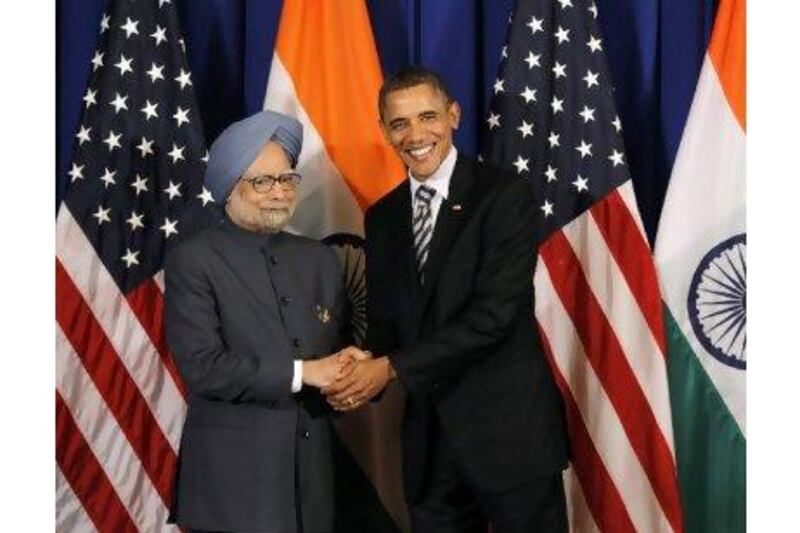The story Nuclear laws come between India and US (November 19) demands comment on this highly sensitive issue, especially as the nuclear rivalry between these intensely competitive nations escalates.
The deal in July 2005, between then-US President George W Bush and Indian Prime Minister Manmohan Singh, lifted a three-decade moratorium on US nuclear trade with India. India's civilian nuclear energy programme has been assisted by the US which in return gained billions of dollars.
Nonetheless, it is clear that the US has been trying for years to cement its relationship with India (a close ally of the old Soviet Union during the Cold war years) via these deals in order to counterbalance the influence of China.
It is no surprise that Pakistan would benefit from China's military rise in the region in case obvious US favouritism toward India increases and Pakistan does not receive similar favourable deals including on spaceflight, satellite technology and missile defence in the near future.
We will see soon that the purely commercial interests of India in China will be threatened or replaced by any agreement, deal or assistance with US, and that the South China Sea and border management issues will be peacefully solved between India and China on the way towards removing negative vibes between these two Asian nations.
Gaye Caglayan, Dubai
Success shows recovery possible
I refer to the news story Cash boost for Dubai World Central aviation plan (November 17).
This just proves the confidence that many investors and financiers have in the credibility and feasibility of the many infrastructure projects floated by the government.
This is in complete contrast to the media reports and editorials which questioned Dubai and UAE immediately after the global financial crisis, and which continue to do so in the post-recession period. This must serve as a great lesson to some of the media outlets not to get carried away with creating sensationalist news.
One must always understand and remember that the economies of the world are run by people from this planet and not from any other in the solar system. When people have the will there is always a way. Nothing will stop man, his vision and his endeavours.
Amit Bhattacharjie, India
Oil price rise is to be expected
In reference to Oil demand peak 'by 2020' if CO2 is cut aggressively (November 14) it's not a surprise that the price of oil is a major driver in the energy industry.
Price is also affected by supply and demand, just like all other markets.
A new study by the UK-based firm Ricardo Strategic Consulting forecasts that the world's oil consumption will continue to increase yearly for the next nine years, and then drop off sharply. The study goes on to say that by 2035 the demand will be lower than it was last year.
Alfred R, UK
Culture is key when appraising
Excellent advice in Appraisals without anguish (November 18).
I would go as far to say that whenever implementing any kind of appraisal process you should first look to the appropriateness of it in terms of the culture and it's overall likelihood to succeed.
Gary Cattermole, UK
Shocked at mark-up on can of Pepsi
This is in relation to a story from several months ago (Restaurants' charges for water 'wrong and illegal', June 8). I went to an average coffee shop in Dubai and was shocked when I paid Dh14 for a can of Pepsi that has a price tag of Dh1.5.
Ahmad Oneissi, Dubai
Less war rhetoric always welcome
The tension between Iran and the West continues to rise in one of the world's most volatile regions.
Many Iranians believe that sanctions by the West existed in the past for various reasons and now continue in an effort to derail Iran's goal to develop a nuclear programme that is an alternative to oil.
Delusional statements by Benjamin Netanyahu of Israel, and Mahmoud Ahmadinejad of Iran, serve only to raise tensions between the two antagonists.
It is easy to forget than Iran and Israel once viewed each other as allies with common military and trade ties, relations that lasted until 1979.
I would be glad if the rhetoric is toned down before innocent lives are lost in meaningless wars, and oil prices increase once again as a result.
Ali Budak, Abu Dhabi





